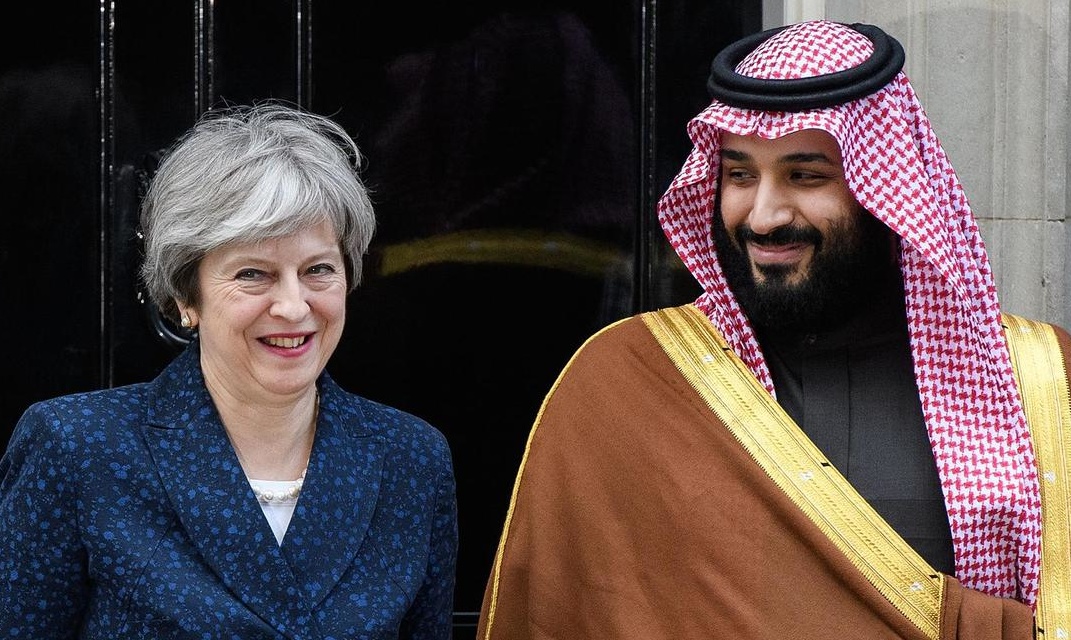UK Prime Minister Theresa May and Saudi Crown Mohammed bin Salman, March 2018 (Leon Neal/Getty)
Co-written with Tom Levitt and published by the Guardian:
Saudi exiles living in the UK have spoken of threats to their lives and harassment over their support for improvements in human rights in their home country.
Saudi Arabia has been attempting to present itself as a reformed state since the murder of the journalist Jamal Khashoggi by a Saudi hit squad at its consulate in Istanbul in 2018.
It has spent billions on sporting deals and promoting tourism in the country and was recently named host of a UN Commission on Women’s Rights, despite what Amnesty International called its “abysmal” record.
However, Saudis living in the UK say they have faced a barrage of threats and abuse after speaking out on rights and the Saudi authorities’ jailing of women’s rights activists.
In one case, a knife was left outside the London home of a human rights activist. His wife and son were approached separately and told that if they disagreed with his views, they could get help from the Saudi Embassy.
“As a father, it really left me worried,” said Yahya Assiri, who has run the human rights organisation ALQST (al-qist means “justice” in Arabic) since 2014. “For the first time, the threat felt real.
“I took my kids away from my own country and brought them here to the UK because it says it upholds democratic values and human rights,” he said.
“There’s No Place That’s Really Safe”
Saudi Arabia, along with Iran, Russia, and Turkey, has been identified by activists as one of the biggest perpetrators of attacks on people outside its borders in a tactic known as transnational repression, which aims to stifle debate or criticism from exiles and refugees who have fled abroad.
At least half a dozen threats to life to Saudis living in exile in the UK and elsewhere in Europe have been reported by the US-based human rights organisation Freedom House.
The Saudi journalist and film-maker Safa al-Ahmad said:
If they decide to go after you, there’s no place that’s really safe. When they decide to kidnap someone, they can do it in any country. They murdered Jamal [Khashoggi] and now it’s business as usual. They were never held accountable.
Exiles living in the UK and elsewhere also fear for the safety of their relatives still living in Saudi Arabia. Activists say the Riyadh authorities retaliate against family members in an effort to coerce those living in exile to return to the country.
Joey Shea, Saudi Arabia researcher at Human Rights Watch, explained:
It’s very rare that they’ve managed to get their whole family out of Saudi, so those who remain are extremely vulnerable.
The physical risks here [in the UK] and the risk to family members back in Saudi Arabia are huge.
The Saudis pioneered a lot of the transnational repression we see today, including using death sentences and decades-long sentences in retaliation against people whose family members are active abroad.
One of Fawzia al-Otaibi’s sisters was banned from leaving Saudi Arabia and another was jailed for 11 years after she herself had been forced to flee the country over her social media posts in support of women’s rights.
“I believe they are punishing and torturing my sisters because they are unable to punish me,” said al-Otaibi, who added that she continued to be threatened while in exile in the UK.
Almost daily [I am receiving] death threats saying that they will poison me and send people loyal to their homeland to kill me at any cost, so that no one will imitate me.
They tell me I’m a traitor not just for the purpose of saying it as a kind of bullying, because that’s exactly what they said about Khashoggi. And if they call a person a traitor, it means that they threaten to punish [them] as a traitor, which is to kill.

